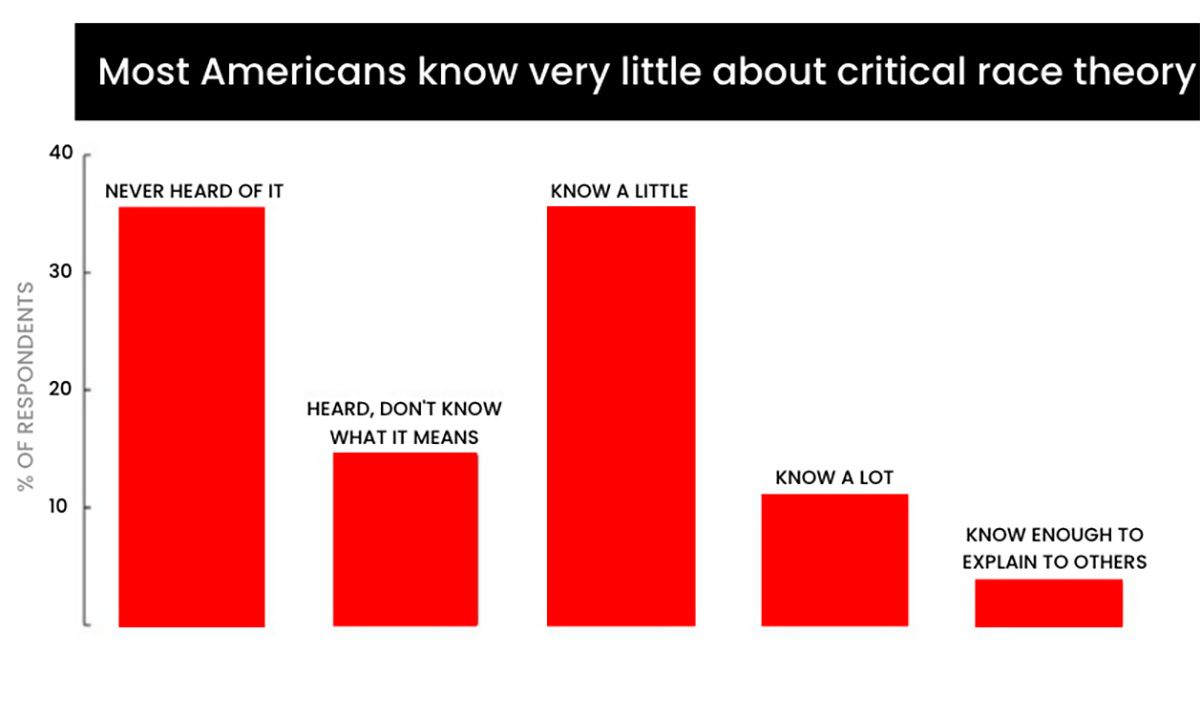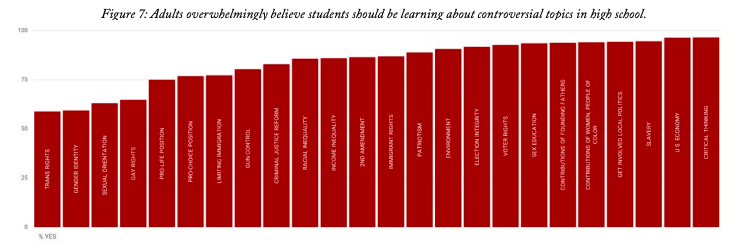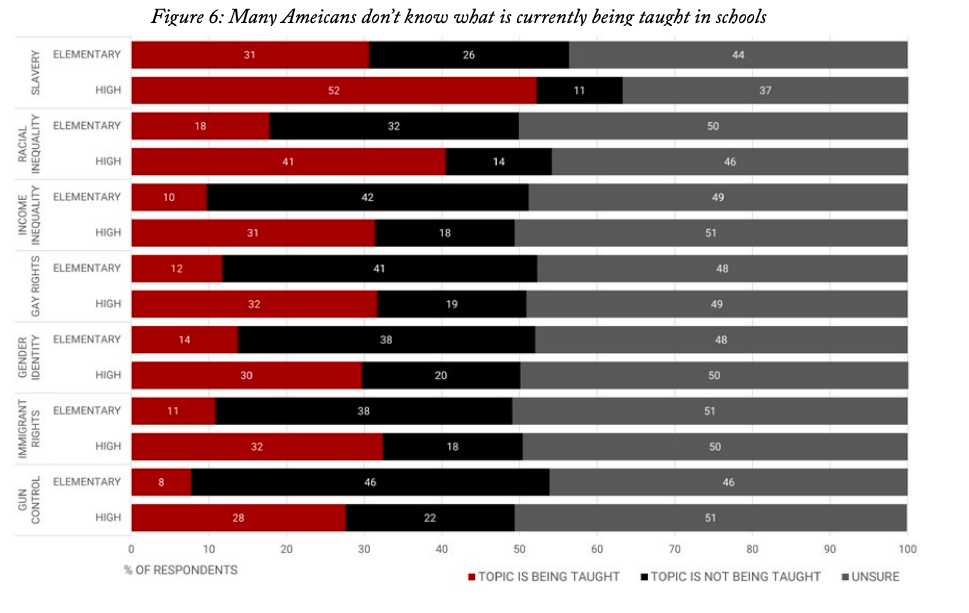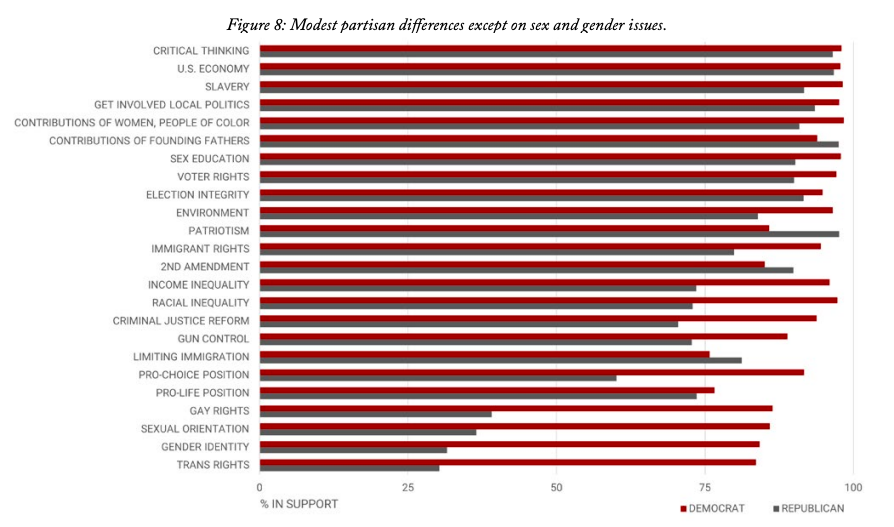Poll: Half of Americans Know Little About CRT, What’s Actually Taught in Schools
Survey finds 'vacuum of knowledge' partisans can exploit, broad support for controversial topics in HS, little backing for instruction on LGBTQ topics

Get stories like these delivered straight to your inbox. Sign up for The 74 Newsletter
Almost half of Americans have never heard of critical race theory, or say they don’t know anything about it, according to a poll administered by a group of researchers at the University of Southern California. Nearly all of those surveyed scored poorly when quizzed about the central tenets of CRT, as the graduate school-level theoretical framework has become commonly known.
Despite headlines about anti-CRT protests and legislation, the poll’s findings “suggest a vacuum of knowledge — especially among lower-income individuals and those with lower levels of education — into which partisans on either side may be able to influence people’s understandings and beliefs about what CRT is,” the researchers state. “Additionally, it calls into question what exactly Americans are reflecting on when they express their beliefs about the role of CRT in public schools.”
Acceptance of some elements of the theory, they also found, cleaves along party lines: “The idea that racism is central and fundamental to the U.S. experience, perhaps the most central tenet of CRT, was highly divisive by political identification, with 69% of Democrats in agreement, compared to just 24% of Republicans.”
The poll was administered by researchers at the university’s Rossier School of Education and Dornsife Center for Economic and Social Research in August and September to 3,751 individuals as part of the Understanding America Study, a decade-long effort tracking economic and social conditions and children’s COVID-era educational experiences. The USC team, which includes curriculum expert Morgan Polikoff, designed the survey to test how representative the “loud voices — and the news coverage amplifying them” are of parents and voters.

The poll found broad agreement that students should be taught controversial topics involving race, gun control, gun ownership rights and abortion in high school, but not elementary grades. Majorities also favored teaching high schoolers about LGBTQ rights and culture, albeit in lower numbers and more likely along partisan divides. Depending on the specific topic, as many as 86% of Democrats supported high school students learning about LGBTQ topics, compared with 30% to 39% of Republicans.
Support for exposing students to topics involving sexual orientation and gender identity was much lower than for other subjects, states the report: “Despite substantial gains in social acceptance and rights for LGBTQ individuals, these results indicate the fragility of those gains and the precarious place in American schools of LGBTQ students and teachers as well as students with LGBTQ parents.”
There is little appetite for teaching younger students about sex or sexuality, gender or violence. Eighty-six percent of respondents said elementary pupils should be taught about the Founding Fathers; 85%, patriotism and the contributions of women and people of color; 84%, critical thinking; 75%, the history of slavery; and 61%, racial inequality. Those polled were evenly divided on immigrant and voter rights.

In general, however, respondents do not think elementary students actually are being taught about the subjects they oppose. And most acknowledged they don’t know which topics are, in fact, taught — a finding that held true regardless of whether a household had school-aged children.
“On most topics, Republicans and Democrats agree about whether students should learn/read about them or not,” the researchers write. “These findings suggest that efforts by Republicans to target the early-grades curriculum are politically shrewd, given the widespread belief that young children should be sheltered from these issues.”

Those polled differed on which books should be assigned by teachers versus which should simply be made available. Most Americans oppose students of any age being assigned books with LGBTQ topics, profanity and depictions of violence or sex, though there is broad support for high school students having access to books on almost all the topics surveyed.
“Considering these findings, recent laws stifling the teaching of controversial topics in high school run counter to the overwhelming views of Americans of both parties that these topics should be taught in balanced ways,” the researchers note.
There is widespread agreement that parents should have more control over the curriculum than they currently do, and high support among Republicans that parents should be able to opt their children out of content with which they disagree.
“Majorities of Americans from all racial/ethnic, income and education groups support parents opting their children out of lessons with content they disagree with (as do just under half of Democrats),” says the report. “Should this level of opting-out materialize, it would be a logistical nightmare for already overburdened teachers and schools.”
Get stories like these delivered straight to your inbox. Sign up for The 74 Newsletter


